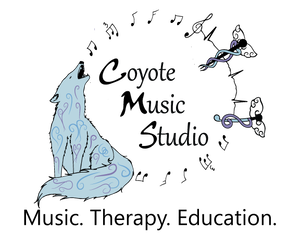|
I never really understood myself as a musician until I played in a rock band. I was a classically trained flautist with a master's degree in Music Therapy. I had been writing my own songs for a few years before starting the band Synesthesia Battery (originally Earthshine) but they never sounded finished. It was just me on my guitar or piano playing chords and singing. Nothing wrong with that, people get famous on it every day but writing music with a group of people made me view learning music in a different light. My songs became something else, something better, something with more life and a personality on their own. They became fully-finished songs that I was proud to sing out into the world. Even though I had played in concert/symphonic bands my entire flute-career, I never quite learned that same lesson. It took me a long time to understand why.
Often in the Synesthesia Battery rehearsals we would just jam. We weren't practicing a song but just improvising - playing through a chord structure, listening to what everyone else is doing, and trying to make it sound like a song not just notes. In college Symphonic Band rehearsals I had a part I had to play too but it was all written in front of me. It told me when to play which notes, their duration, their rhythm, their dynamics, when I was important and when I wasn't. We're always told to listen across and I'm sure every single classical musician will say they do, but honestly we don't have to and I think a lot of us don't. In the same respect, I enjoy teaching private lessons for how deep we get to dive into the music and explore the nuances of making music instead of just playing notes. If you want to master an instrument, private lessons are necessary but if you want understand how to truly play music on that instrument, you have to play with other musicians and you have to play without notes in front of you. You have to understand how your part fits into the whole. Not everyone can be the soloist all the time or the music loses its beauty. As Chris Rock puts it so brilliantly, "sometimes, you’re on tambourine. And if you’re on tambourine, play it right. Play it right. Play it with a ... smile, because no one wants to see a mad tambourine player. If you’re gonna play the tambourine, play it right." You better rock that tambourine like you're the First Tambourine in the Galaxy Symphony and improvising with other musicians helps you understand that. Learning music, not just playing, in a social context is even more beneficial. When we learn music in a social context, often there are more experienced musicians playing alongside beginners. The more experienced musicians can keep the music going, keep the progression developing, while the beginners play simple melodies and rhythms. This allows everyone to not just feel like musicians, but to BE musicians even at the beginner level. The successful experience of making interesting and fun music gives beginners confidence to try new things, to expand their skills faster than they might when practicing alone. It also allows them hear what experienced musicians do musically when they make mistakes and the more adventurous beginners will try to imitate it. Jazz musicians will tell you nothing is a mistake if you can make it fit. Playing music with beginners also benefits experienced musicians. Teachers know that there are 4 Levels of Learning: Observe, Do With Help, Do Alone, and Teach. Outside of an academic classroom we tend to stop at Level 3: Do Alone because we think if we can do it by ourselves then we must truly understand that thing. How many times have you been sitting with a friend and when they asked you to explain something you said, "well, I know how to do it, I just can't put it in words." Think about another time when you were able to explain something you're passionate about with expert detail. Think about the interesting conversation that erupted from those details. Your friend learned something from that teaching but you also learned because in explaining it to your friend you were able to dive deeper into the subject than you had before. Your friend's questions and reactions to your preferred subject most likely made you look at it in a way you hadn't before, giving you new insight into something you thought you knew everything about. Teaching music is the same. When musicians have a chance to get to the 4th Level of Learning: Teaching, they have a chance to explore music in a way that allows them to learn more about it. In my classes I often have more experienced students teach some of the concepts to the beginners for this very reason. I am always there to help give more detail if necessary but I find that students relate to each other better than they relate to the teacher - no matter the age. Even adult students relate to each other more than they do to an adult teacher. This is probably because of the nature of the teacher/student dynamic. I remember teaching a fellow classmate a concept we were discussing in my high school Literature class and when he understood it I thought to myself, "but I said it just the way the teacher did." Now that I'm a teacher I know I probably said it in a slightly different way that he related to better. I see it so many times now with my students. I'll be teaching and someone just doesn't understand a concept, like the difference in note values (quarter, half, whole), and I feel I've exhausted every way of explaining it while giving musical examples. Then the kid sitting next to them says something (that seems like what I just said) and the other child can suddenly do it. I believe in this fourth level of learning. I feel it is necessary and therefore it's why I plan more classes than private lessons for Early Childhood Music development. Like I said, private lessons are encouraged and very much necessary, but music is social and should be learned that way.
0 Comments
|
Coyote
|
Proudly powered by Weebly


 RSS Feed
RSS Feed